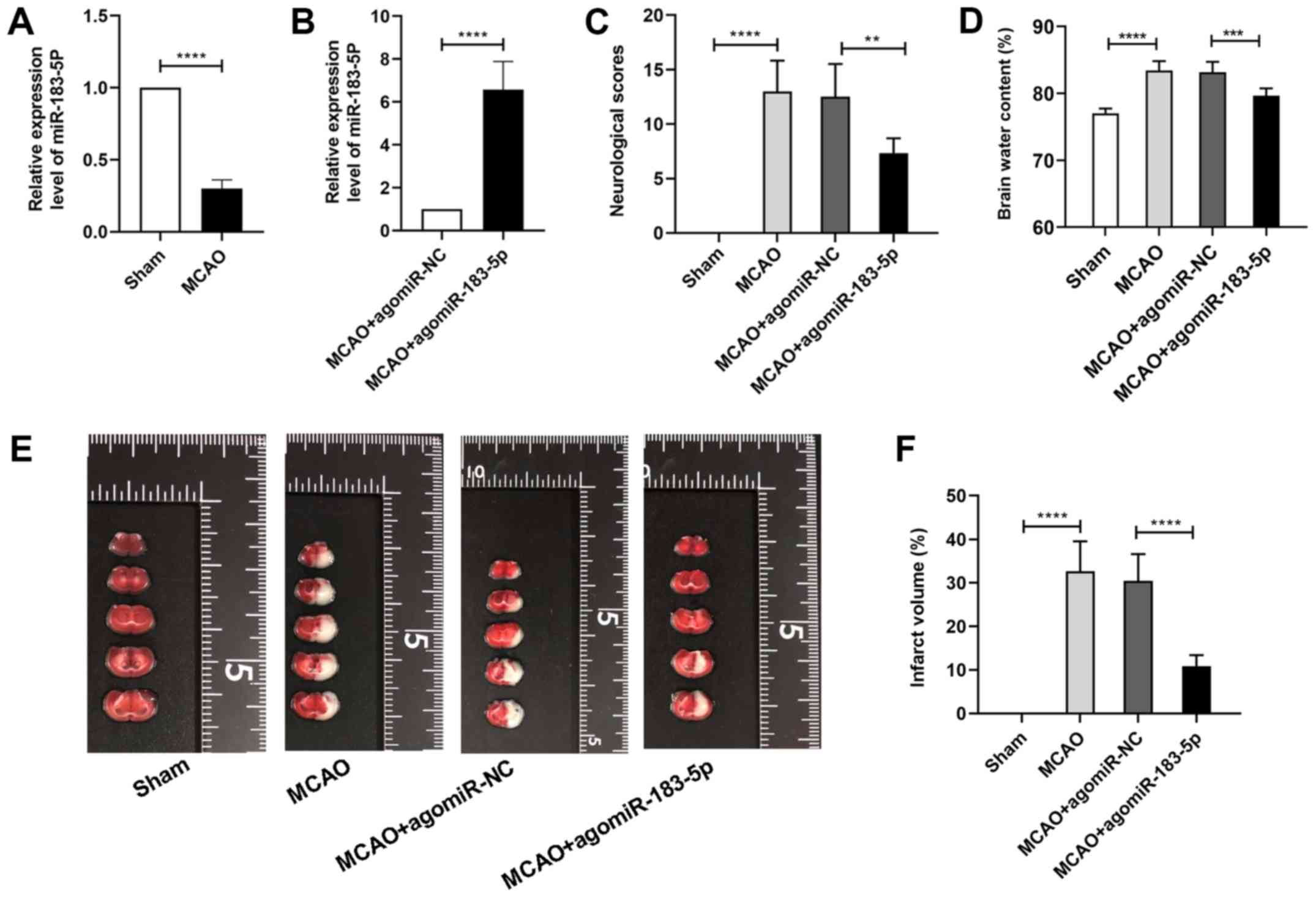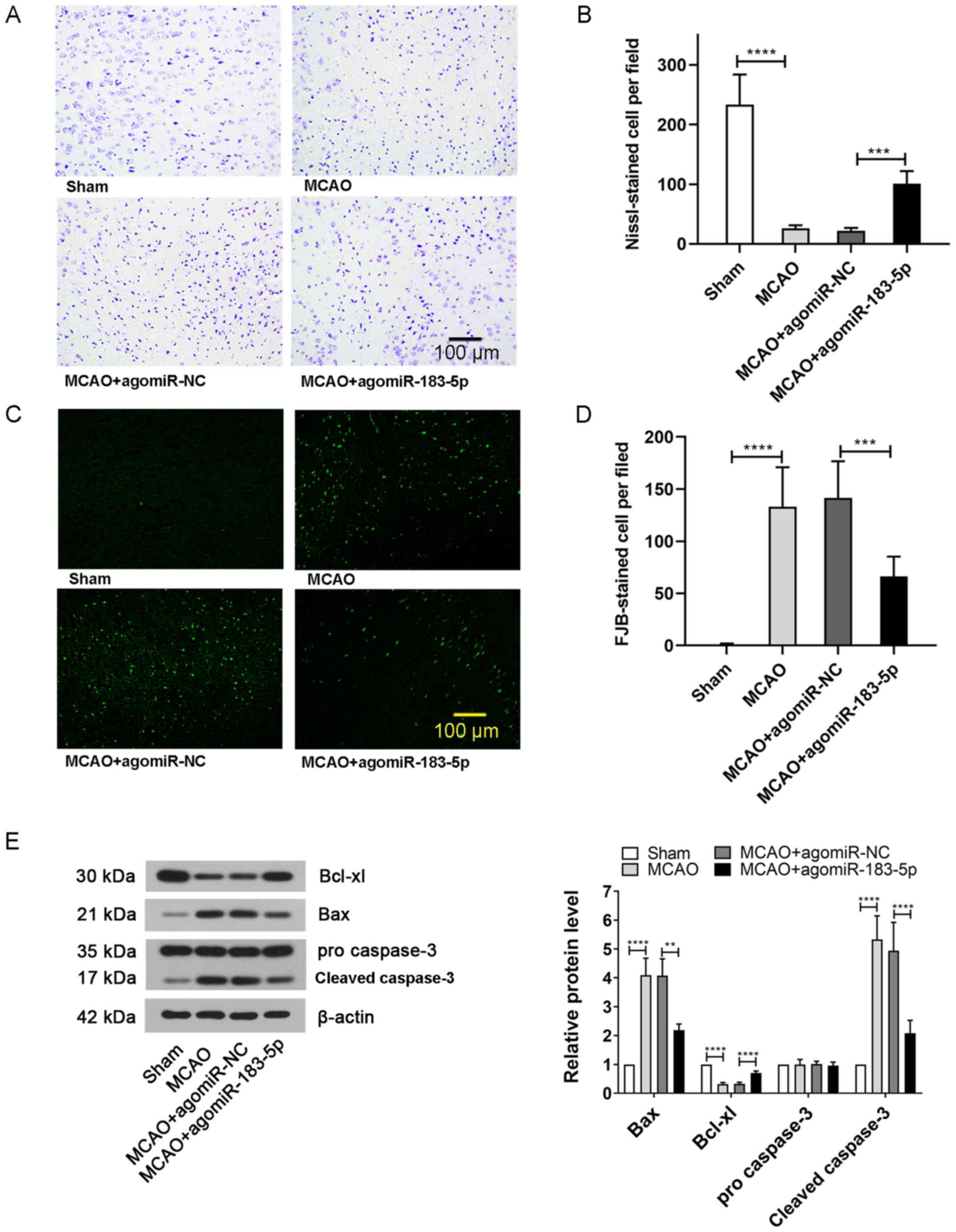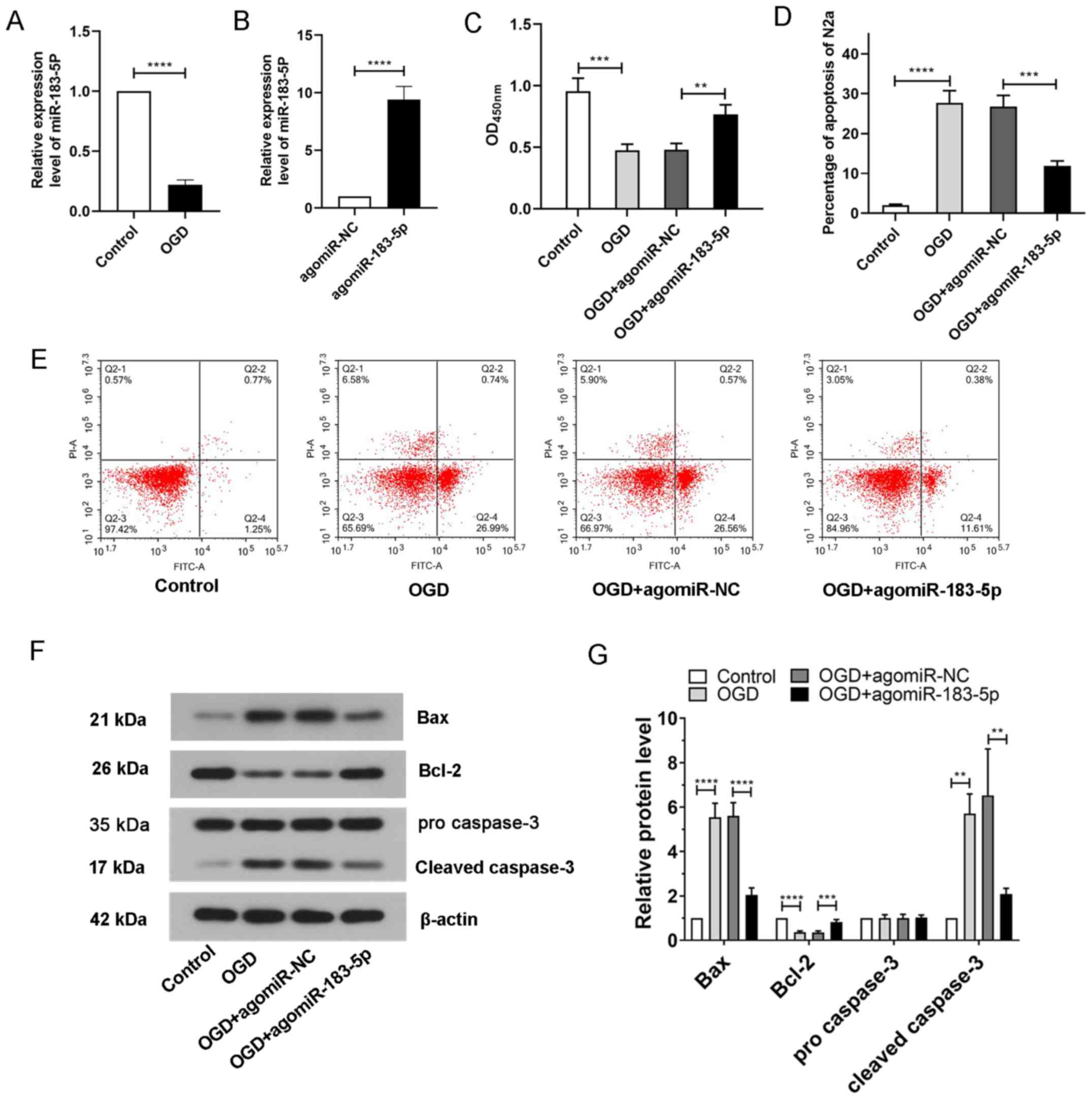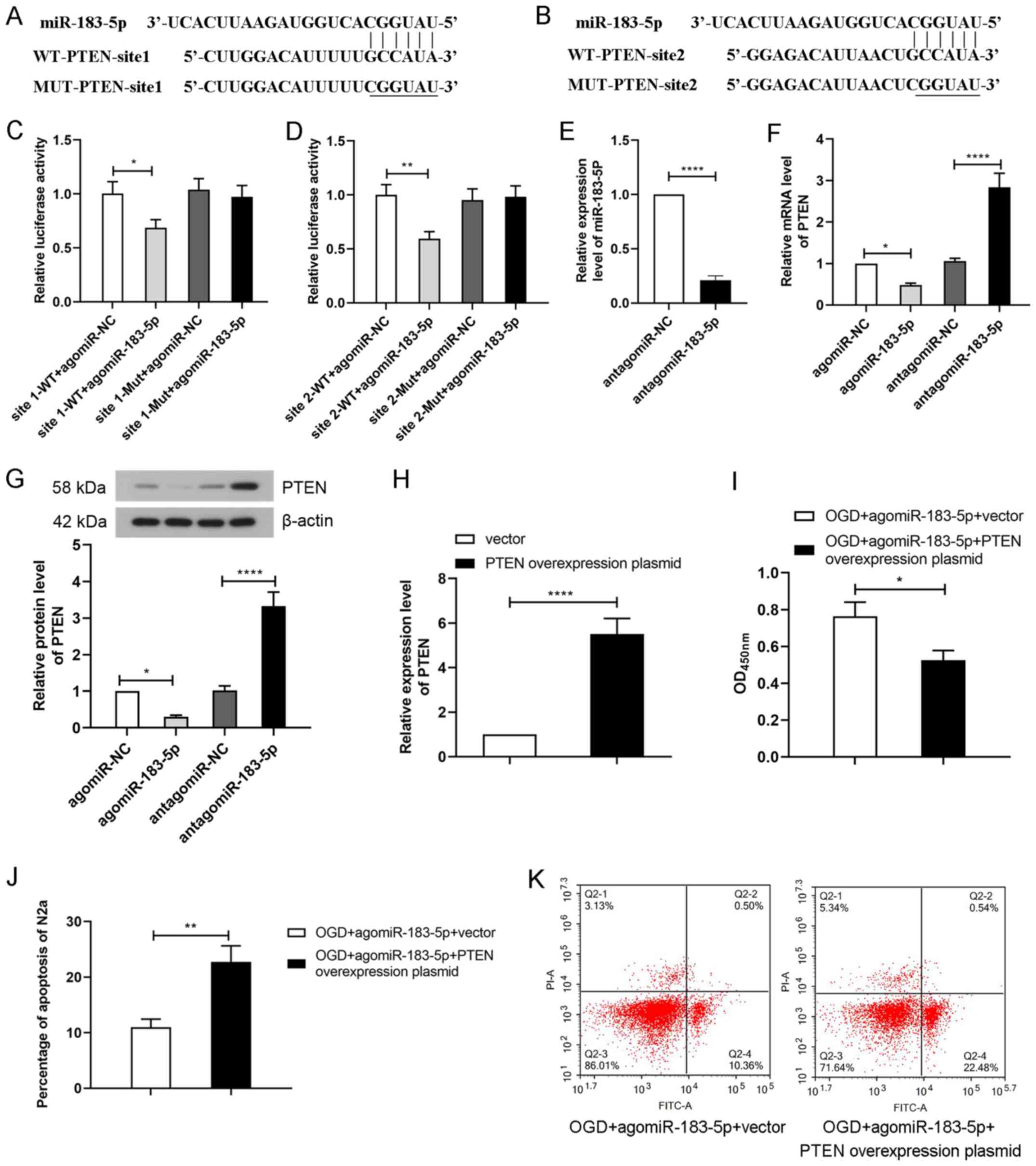|
1
|
Singh V, Roth S, Veltkamp R and Liesz A:
HMGB1 as a key mediator of immune mechanisms in ischemic stroke.
Antioxid Redox Signal. 24:635–651. 2016. View Article : Google Scholar : PubMed/NCBI
|
|
2
|
Zerna C, Hegedus J and Hill MD: Evolving
treatments for acute ischemic stroke. Circ Res. 118:1425–1442.
2016. View Article : Google Scholar : PubMed/NCBI
|
|
3
|
Lakhan SE, Kirchgessner A and Hofer M:
Inflammatory mechanisms in ischemic stroke: Therapeutic approaches.
J Transl Med. 7:972009. View Article : Google Scholar : PubMed/NCBI
|
|
4
|
Fonarow GC, Smith EE, Saver JL, Reeves MJ,
Bhatt DL, Grau-Sepulveda MV, Olson DM, Hernandez AF, Peterson ED
and Schwamm LH: Timeliness of tissue-type plasminogen activator
therapy in acute ischemic stroke: Patient characteristics, hospital
factors, and outcomes associated with door-to-needle times within
60 minutes. Circulation. 123:750–758. 2011. View Article : Google Scholar : PubMed/NCBI
|
|
5
|
Rami A and Kogel D: Apoptosis meets
autophagy-like cell death in the ischemic penumbra: Two sides of
the same coin? Autophagy. 4:422–426. 2008. View Article : Google Scholar : PubMed/NCBI
|
|
6
|
Hammond S: An overview of microRNAs. Adv
Drug Deliv Rev. 87:3–14. 2015. View Article : Google Scholar : PubMed/NCBI
|
|
7
|
Li G, Morris-Blanco KC, Lopez MS, Yang T,
Zhao H, Vemuganti R and Luo Y: Impact of microRNAs on ischemic
stroke: From pre- to post-disease. Prog Neurobiol. 163-164:59–78.
2018. View Article : Google Scholar : PubMed/NCBI
|
|
8
|
Birch D, Britt BC, Dukes SC, Kessler JA
and Dizon ML: MicroRNAs participate in the murine oligodendroglial
response to perinatal hypoxia-ischemia. Pediatr Res. 76:334–340.
2014. View Article : Google Scholar : PubMed/NCBI
|
|
9
|
Majdi A, Mahmoudi J, Sadigh-Eteghad S,
Farhoudi M and Shotorbani SS: The interplay of microRNAs and
post-ischemic glutamate excitotoxicity: An emergent research field
in stroke medicine. Neurol Sci. 37:1765–1771. 2016. View Article : Google Scholar : PubMed/NCBI
|
|
10
|
Chang L, Zhang W, Shi S, Peng Y, Wang D,
Zhang L and Zhang J: microRNA-195 attenuates neuronal apoptosis in
rats with ischemic stroke through inhibiting KLF5-mediated
activation of the JNK signaling pathway. Mol Med. 26:312020.
View Article : Google Scholar : PubMed/NCBI
|
|
11
|
Pierce ML, Weston MD, Fritzsch B, Gabel
HW, Ruvkun G and Soukup GA: Microrna-183 family conservation and
ciliated neurosensory organ expression. Evol Dev. 10:106–113. 2008.
View Article : Google Scholar : PubMed/NCBI
|
|
12
|
Lin HC, Liu SY, Yen EY, Li TK and Lai IR:
microRNA-183 mediates protective postconditioning of the liver by
repressing Apaf-1. Antioxid Redox Signal. 26:583–597. 2017.
View Article : Google Scholar : PubMed/NCBI
|
|
13
|
Gong L, Xu H, Chang H, Tong Y, Zhang T and
Guo G: Knockdown of long non-coding RNA MEG3 protects H9c2 cells
from hypoxia-induced injury by targeting microRNA-183. J Cell
Biochem. 119:1429–1440. 2018. View Article : Google Scholar : PubMed/NCBI
|
|
14
|
Garcia-Junco-Clemente P and Golshani P:
PTEN: A master regulator of neuronal structure, function, and
plasticity. Commun Integr Biol. 7:e283582014. View Article : Google Scholar : PubMed/NCBI
|
|
15
|
Miao SY, Miao SM, Cui RT, Yu AL and Miao
ZJ: SETD5-AS1 stimulates neuron death in stroke via promoting PTEN
expression. Eur Rev Med Pharmacol Sci. 22:6035–6041.
2018.PubMed/NCBI
|
|
16
|
Sarver AL, Li L and Subramanian S:
MicroRNA miR-183 functions as an oncogene by targeting the
transcription factor EGR1 and promoting tumor cell migration.
Cancer Res. 70:9570–9580. 2010. View Article : Google Scholar : PubMed/NCBI
|
|
17
|
Thiel J, Alter C, Luppus S, Eckstein A,
Tan S, Führer D, Pastille E, Westendorf AM, Buer J and Hansen W:
MicroRNA-183 and microRNA-96 are associated with autoimmune
responses by regulating T cell activation. J Autoimmun. 96:94–103.
2019. View Article : Google Scholar : PubMed/NCBI
|
|
18
|
Guo D, Ma J, Li T and Yan L: Up-regulation
of miR-122 protects against neuronal cell death in ischemic stroke
through the heat shock protein 70-dependent NF-kappaB pathway by
targeting FOXO3. Exp Cell Res. 369:34–42. 2018. View Article : Google Scholar : PubMed/NCBI
|
|
19
|
Ni J, Wang X, Chen S, Liu H, Wang Y, Xu X,
Cheng J, Jia J and Zhen X: MicroRNA let-7c-5p protects against
cerebral ischemia injury via mechanisms involving the inhibition of
microglia activation. Brain Behav Immun. 49:75–85. 2015. View Article : Google Scholar : PubMed/NCBI
|
|
20
|
Chen J, Sanberg PR, Li Y, Wang L, Lu M,
Willing AE, Sanchez-Ramos J and Chopp M: Intravenous administration
of human umbilical cord blood reduces behavioral deficits after
stroke in rats. Stroke. 32:2682–2688. 2001. View Article : Google Scholar : PubMed/NCBI
|
|
21
|
Yoon S, Woo SU, Kang JH, Kim K, Kwon MH,
Park S, Shin HJ, Gwak HS and Chwae YJ: STAT3 transcriptional factor
activated by reactive oxygen species induces IL6 in
starvation-induced autophagy of cancer cells. Autophagy.
6:1125–1138. 2010. View Article : Google Scholar : PubMed/NCBI
|
|
22
|
Wang X, Wang S, Wang J, Guo H, Dong Z,
Chai L, Hu L, Zhang Y, Wang H and Chen L: Neuroprotective effect of
xueshuantong for injection (Lyophilized) in transient and permanent
rat cerebral ischemia model. Evid Based Complement Alternat Med.
2015:1346852015. View Article : Google Scholar : PubMed/NCBI
|
|
23
|
Gong SJ, Chen LY, Zhang M, Gong JX, Ma YX,
Zhang JM, Wang YJ, Hu YY, Sun XC, Li WB and Zhang Y: Intermittent
hypobaric hypoxia preconditioning induced brain ischemic tolerance
by up-regulating glial glutamate transporter-1 in rats. Neurochem
Res. 37:527–537. 2012. View Article : Google Scholar : PubMed/NCBI
|
|
24
|
Livak KJ and Schmittgen TD: Analysis of
relative gene expression data using real-time quantitative PCR and
the 2(-Delta Delta C(T)) method. Methods. 25:402–408. 2001.
View Article : Google Scholar : PubMed/NCBI
|
|
25
|
Woodruff TM, Thundyil J, Tang SC, Sobey
CG, Taylor SM and Arumugam TV: Pathophysiology, treatment, and
animal and cellular models of human ischemic stroke. Mol
Neurodegener. 6:112011. View Article : Google Scholar : PubMed/NCBI
|
|
26
|
Yonekura I, Kawahara N, Nakatomi H, Furuya
K and Kirino T: A model of global cerebral ischemia in C57 BL/6
mice. J Cereb Blood Flow Metab. 24:151–158. 2004. View Article : Google Scholar : PubMed/NCBI
|
|
27
|
Doyle KP, Simon RP and Stenzelpoore MP:
Mechanisms of ischemic brain damage. Neuropharmacology. 55:310–318.
2008. View Article : Google Scholar : PubMed/NCBI
|
|
28
|
Yin KJ, Deng Z, Huang H, Hamblin M, Xie C,
Zhang J and Chen YE: miR-497 regulates neuronal death in mouse
brain after transient focal cerebral ischemia. Neurobiol Dis.
38:17–26. 2010. View Article : Google Scholar : PubMed/NCBI
|
|
29
|
Zhang N, Zhong J, Han S, Li Y, Yin Y and
Li J: MicroRNA-378 alleviates cerebral ischemic injury by
negatively regulating apoptosis executioner caspase-3. Int J Mol
Sci. 17:14272016. View Article : Google Scholar
|
|
30
|
Banks SA, Pierce ML and Soukup GA:
Sensational MicroRNAs: Neurosensory roles of the MicroRNA-183
family. Mol Neurobiol. 57:358–371. 2020. View Article : Google Scholar : PubMed/NCBI
|
|
31
|
Duan X, Gan J, Peng DY, Bao Q, Xiao L, Wei
L and Wu J: Identification and functional analysis of microRNAs in
rats following focal cerebral ischemia injury. Mol Med Rep.
19:4175–4184. 2019.PubMed/NCBI
|
|
32
|
Ye Y, Jin T, Zhang X, Zeng Z, Ye B, Wang
J, Zhong Y, Xiong X and Gu L: Meisoindigo protects against focal
cerebral ischemia-reperfusion injury by inhibiting NLRP3
inflammasome activation and regulating microglia/macrophage
polarization via TLR4/NF-κB signaling pathway. Front Cell Neurosci.
13:5532019. View Article : Google Scholar : PubMed/NCBI
|
|
33
|
Park SJ, Nam KW, Lee HJ, Cho EY, Koo U and
Mar W: Neuroprotective effects of an alkaloid-free ethyl acetate
extract from the root of Sophora flavescens Ait. against focal
cerebral ischemia in rats. Phytomedicine. 16:1042–1051. 2009.
View Article : Google Scholar : PubMed/NCBI
|
|
34
|
Truong DT, Venna VR, McCullough LD and
Fitch RH: Deficits in auditory, cognitive, and motor processing
following reversible middle cerebral artery occlusion in mice. Exp
Neurol. 238:114–121. 2012. View Article : Google Scholar : PubMed/NCBI
|
|
35
|
Shi DN, Yuan YT, Ye D, Kang LM, Wen J and
Chen HP: MiR-183-5p alleviates chronic constriction injury-induced
neuropathic pain through inhibition of TREK-1. Neurochem Res.
43:1143–1149. 2018. View Article : Google Scholar : PubMed/NCBI
|
|
36
|
Pilchova I, Klacanova K, Chomova M,
Tatarkova Z, Dobrota D and Racay P: Possible contribution of
proteins of Bcl-2 family in neuronal death following transient
global brain ischemia. Cell Mol Neurobiol. 35:23–31. 2015.
View Article : Google Scholar : PubMed/NCBI
|
|
37
|
Datta A, Sarmah D, Mounica L, Kaur H,
Kesharwani R, Verma G, Veeresh P, Kotian V, Kalia K, Borah A, et
al: Cell death pathways in ischemic stroke and targeted
pharmacotherapy. Transl Stroke Res. 26–Mar;2020.(Epub ahead of
print). View Article : Google Scholar : PubMed/NCBI
|
|
38
|
Cory S, Huang DC and Adams JM: The Bcl-2
family: Roles in cell survival and oncogenesis. Oncogene.
22:8590–8607. 2003. View Article : Google Scholar : PubMed/NCBI
|
|
39
|
Massieu L, Moran J and Christen Y: Effect
of Ginkgo biloba (EGb 761) on staurosporine-induced neuronal death
and caspase activity in cortical cultured neurons. Brain Res.
1002:76–85. 2004. View Article : Google Scholar : PubMed/NCBI
|
|
40
|
Yu XQ, Xue CC, Zhou ZW, Li CG, Du YM,
Liang J and Zhou SF: In vitro and in vivo neuroprotective effect
and mechanisms of glabridin, a major active isoflavan from
Glycyrrhiza glabra (licorice). Life Sci. 82:68–78. 2008.
View Article : Google Scholar : PubMed/NCBI
|
|
41
|
Oudit GY, Sun H, Kerfant BG, Crackower MA,
Penninger JM and Backx PH: The role of phosphoinositide-3 kinase
and PTEN in cardiovascular physiology and disease. J Mol Cell
Cardiol. 37:449–471. 2004. View Article : Google Scholar : PubMed/NCBI
|
|
42
|
Xing Y, Wang MM, Feng YS, Dong F and Zhang
F: Possible involvement of PTEN signaling pathway in the
anti-apoptotic effect of electroacupuncture following ischemic
stroke in rats. Cell Mol Neurobiol. 38:1453–1463. 2018. View Article : Google Scholar : PubMed/NCBI
|
|
43
|
Zhao D, Chen J, Zhang Y, Liao HB, Zhang
ZF, Zhuang Y, Pan MX, Tang JC, Liu R, Lei Y, et al: Glycine confers
neuroprotection through PTEN/AKT signal pathway in experimental
intracerebral hemorrhage. Biochem Biophys Res Commun. 501:85–91.
2018. View Article : Google Scholar : PubMed/NCBI
|
|
44
|
Zheng T, Shi Y, Zhang J, Peng J, Zhang X,
Chen K, Chen Y and Liu L: MiR-130a exerts neuroprotective effects
against ischemic stroke through PTEN/PI3K/AKT pathway. Biomed
Pharmacother. 117:1091172019. View Article : Google Scholar : PubMed/NCBI
|


















